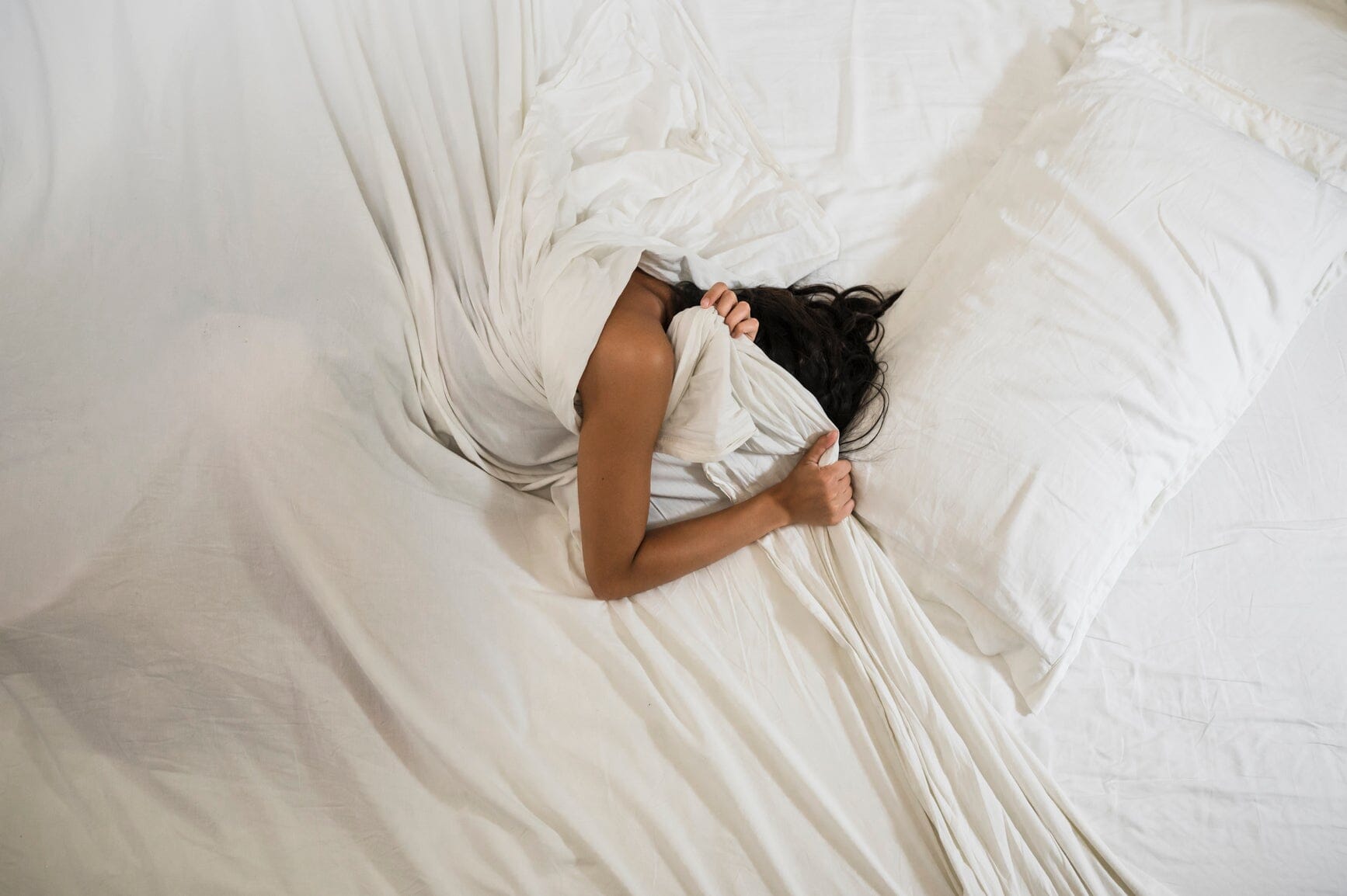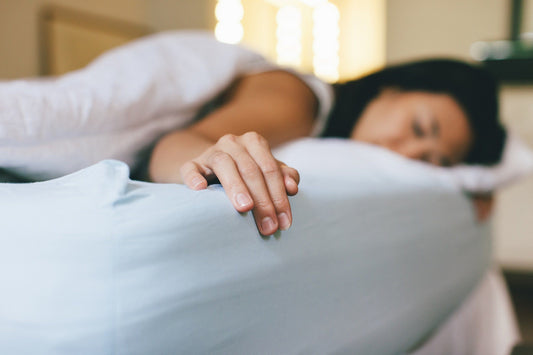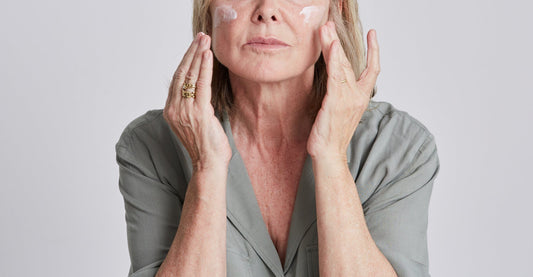Women can experience a range of physical and emotional symptoms before their periods. Known as premenstrual syndrome, or PMS for short, this collection of physical and emotional symptoms, which are by definition cyclical and resolve with menstruation, vary in severity from person to person. If you're one of the many women that’s noticing difficulty with sleeping leading up to or during your period, you may be wondering, “is PMS affecting my sleep?”
In this article, we’ll take a closer look at the link between hormones and sleeping issues to help you better understand what may be going on in your body to cause these sleep related problems. We’ll also provide a few simple tips that may work to help improve your sleep quality and quantity, especially if you’re experiencing PMS or are in perimenopause.
Does PMS Cause Insomnia?
Did you know that women are at least twice as likely to experience insomnia when they're premenstrual?1 Insomnia, by definition, is a disorder that is accompanied by a range of sleep-related symptoms, such as struggling to fall asleep, issues staying asleep or not being able to get enough good, quality sleep.2
Women might experience insomnia and other sleep disturbances alongside PMS for several reasons. First, the hormonal changes occurring in your body during this time can certainly impact sleep quality. Low serotonin levels, which can occur as your period approaches, may trigger a range of PMS symptoms, including insomnia.3 Hormonal shifts experienced can also contribute to night sweats, as estrogen levels decrease right before your period; falling estrogen is a common cause of night sweats associated with PMS.4 When you feel hot, falling and staying asleep can be difficult.
Body temperature also plays an important role in normalizing your body’s sleep-wake cycle, also known as your circadian rhythm, which works to promote consistent and restorative sleep.5 If this rhythm is disrupted, your sleep cycles may be as well.
Some of the other common symptoms associated with PMS can also make getting to sleep and staying asleep challenging. It can be difficult to get comfortable when your breasts are tender or if you’re experiencing painful menstrual cramps, for example. Emotional symptoms, such as depressed moods, anxiety, or even increased irritability, can also affect your ability to fall asleep and stay asleep during this time.6
Check out this quick informational video on sleeplessness and PMS from Chief Medical Officer, Dr. Alyssa Dweck, below:
Can PMDD Affect Sleep?
Premenstrual dysphoric disorder, or PMDD, can also impact your sleep quality. This condition is considered to be a more severe form of PMS that can cause intense symptoms and disrupt activities and relationships in the week or two leading up to your period.7 PMDD is also cyclical, with symptoms abating with or soon after the onset of menstruation. As many as 70% of women who experience PMDD battle with insomnia.8
There may be two reasons for this. Depressed and anxious moods can be disruptive and impact quality and quantity of sleep.9 Studies also show women with PMDD may be less responsive to melatonin during their luteal phase; melatonin being a hormone that works to help to prepare the body for sleep.10
*Note, melatonin supplementation is not to be considered a treatment for PMDD
Can Perimenopause Impact Sleep?
When periods start to become irregular during perimenopause, sleeping well may become even more challenging. An estimated 39% to 47% of perimenopausal women have reported struggling with disturbed sleep during this transitional period.11
Hormonal fluctuations are often thought to be a key contributor to these sleep issues. Levels of progesterone and estrogen start to shift during perimenopause and the volatility of these hormones have been shown to impact sleep quality.12 Higher cortisol levels experienced during this stage of the menopause transition, specifically at night, can also contribute to a stronger “flight or fight” response – which can be detrimental to sleep.13
As the transition toward menopause continues, fluctuating hormone levels eventually fall, dramatically. This can trigger symptoms such as hot flashes and night sweats, which can impact one’s ability to get comfortable in bed or to stay asleep – some periods of sweating can be so severe that they lead women to soak through their bed clothes or sheets, causing them to get up repeatedly during the night.
How Can You Improve Your Sleep Quality?
Whether you’re experiencing PMS or you’re perimenopausal, these simple strategies may be just what you need to sleep a bit better:
- Consider talking with your healthcare provider – they understand your medical history and lifestyle best and can likely offer personalized solutions.
- Try to go to bed and wake up at the same time in order to train your internal clock and get into a consistent sleep routine.
- Do your best to avoid caffeine and alcohol before bed, as both can disrupt sleep.14
- Steer clear of screens before bedding down for the evening and consider adopting a relaxing routine, such as taking a bath, reading a book, or practicing yoga to help calm your mind and body.
- Choose comfortable and breathable sleep garments and sheets to stay comfortable and not too warm.
- Ensure your bedroom is quiet, dark, and cool. Temperatures between 60 and 67 degrees are considered to be ideal for sleep.15
- Consider a dietary supplement if emotional symptoms from PMS are keeping you up at night. Some women have found success with SerenolTM, which is designed to reduce irritability and mood swings associated with hormonal shifts, like those commonly experienced with PMS or during perimenopause.*
- Try to exercise regularly and consider what you eat. Diets like the Mediterranean Diet have been shown to support sleep quality.16
- Test out a mobile sleep app that offers meditation exercises and/or calming sounds to help you fall asleep.
- Consider over the counter sleep aids (i.e. melatonin, Tylenol PM, etc.) especially if you’re finding that painful menstrual cramps are an issue.
If you’re struggling to fall or stay asleep, hormonal symptoms caused by PMS or perimenopause may be to blame. But you don’t just have to accept restless nights. Adopting healthy habits can help you improve your sleep quality and enable you to wake up feeling well-rested. And if all else fails, be sure to contact your healthcare provider. They can work with you to help get your sleep cycle back on track.
Resources:
- https://www.healthline.com/health/insomnia/pms-insomnia
- https://www.nhlbi.nih.gov/health/insomnia
- https://www.mayoclinic.org/diseases-conditions/premenstrual-syndrome/symptoms-causes/syc-20376780
- https://my.clevelandclinic.org/health/symptoms/16562-night-sweats
- https://www.sleepfoundation.org/circadian-rhythm
- https://www.webmd.com/women/pms/features/why-pms-gives-you-insomnia
- https://www.hopkinsmedicine.org/health/conditions-and-diseases/premenstrual-dysphoric-disorder-pmdd
- https://www.healthline.com/health/insomnia/pms-insomnia
- https://www.webmd.com/women/pms/features/why-pms-gives-you-insomnia
- https://www.healthline.com/health/insomnia/pms-insomnia#causes
- https://www.ncbi.nlm.nih.gov/pmc/articles/PMC3185248/
- https://www.healthline.com/health/insomnia/hormonal-insomnia-symptoms
- https://www.ncbi.nlm.nih.gov/pmc/articles/PMC2749064/
- https://www.sleephealthfoundation.org.au/sleep-topics/caffeine-food-alcohol-smoking-and-sleep
- https://health.clevelandclinic.org/what-is-the-ideal-sleeping-temperature-for-my-bedroom
- https://www.sleepfoundation.org/nutrition








